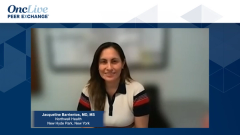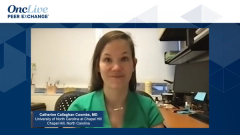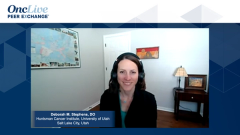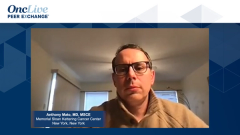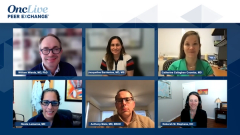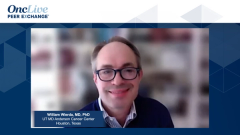
Noncovalent BTK Inhibitors in CLL
Recommendations for applying information from clinical trials presented at oncology and hematology conferences in 2021 into routine clinical practice when managing patients with chronic lymphocytic leukemia.
Episodes in this series

Transcript:
William Wierda, MD, PhD: Let’s turn to new treatments. One drug that’s furthest along in development is called pirtobrutinib, which Anthony updated at ASH [American Society of Hematology Annual Meeting] 2021. Anthony, can you introduce reversible inhibitors of BTK [Bruton tyrosine kinase] and summarize the update on pirtobrutinib? Then we’ll have Callie discuss nemtabrutinib as another drug within that category of reversible inhibitors.
Anthony Mato, MD, MSCE: As an intro to the topic, these molecules are meant to bind in a noncovalent way to an alternative binding site on BTK to circumvent the main and known mechanism of resistance to covalent inhibitors, which are Cys481 mutations. Pirtobrutinib is a specific noncovalent BTK inhibitor that works as well in wild type preclinically as it did in mutated CLL [chronic lymphocytic leukemia] in models. It looks to be an ideal BTK inhibitor from the perspective of minimal off-target effects and addresses the main unmet need, which is resistance to covalent inhibitors that are utilizing a treat until progression strategy.
The update to the BRUIN study focused on patients who had prior covalent BTK inhibitors, about 252 patients. The take-homes are simple. It’s active. Response rate was 68%. It got better with time. It seemed to be similarly active, no matter how you looked at patients’ prior therapies, high-risk features, and reasons for discontinuation. Remissions were durable. The median PFS [progression-free survival] was not reached with a short follow-up of 9.4 months. In the double-exposed patients, the median PFS was 18 months. The third point I want to make is that it was safe.
Very few AEs [adverse events] occurred at 15% or higher. BTK-associated adverse events were minimal. AFib [atrial fibrillation] was only 2% in more than 600 patients treated on the trial. The major take-home in terms of safety was a discontinuation rate of less than 1% in the population. We know from other covalent BTK inhibitors that the discontinuation rates with similar follow-up can range from 10% to 20%. Overall, it seemed to be safe and effective, and it addressed an unmet need. It’s a promising molecule, and we’ll probably hear a lot more about this in the future.
William Wierda, MD, PhD: Nemtabrutinib, Callie?
Catherine Callaghan Coombs, MD: Nemtabrutinib has had a lot of names. Formerly it was ARQ 531. Now it’s owned by Merck, so it’s MK-1026 or nemtabrutinib. This is another noncovalent BTK inhibitor. Dr Jennifer Woyach presented the results from the single-arm phase 2 trial, which had several expansion cohorts. This trial hasn’t enrolled anywhere near as many patients, and the report from the abstract was that a little over 100 participants had been enrolled, including patients with a variety of B-cell NHLs [non-Hodgkin lymphomas] but also CLL.
They did present efficacy data that show this drug is also efficacious. They quote a response rate of 58% for patients with CLL—22 of 38 patients—who are primarily PR [partial response] or PRL [PR with treatment-induced lymphocytosis]. The 1 difference with this drug is that it appears that grade 3 adverse events are a bit higher: 68% of patients had grade 3 or higher treatment-emergent AEs. There were a few grade 5 events, specifically in 6% of participants, though those were more commonly because of disease progression in 3 of 7 patients that died. This is an interesting compound that appears to be active but not as many patients and maybe not as low of a toxicity profile when doing a cross-trial comparison of the pirtobrutinib data. It will be interesting to follow what happens with more time and patients on this trial.
William Wierda, MD, PhD: Other reversible inhibitors are in development, perhaps not as far along as pirtobrutinib and nemtabrutinib, which we’ll most likely be hearing about.
Transcript edited for clarity.


